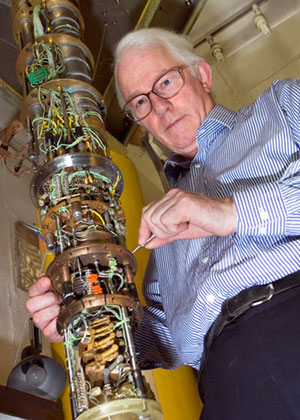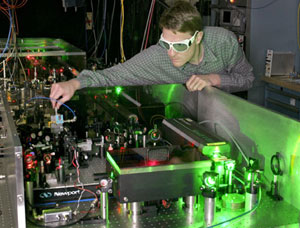Physicist
Tasks & duties

Physicists may do some or all of the following:
-
conduct experiments on matter using sound waves, nuclear particle beams and electromagnetic radiation (for example, light, heat and x-rays)
-
make equipment for experiments and instruments for special measurements (for example, making high-precision instruments that measure and control humidity levels for respiratory support systems)
-
do experiments to test existing physics theories and develop new theories
-
develop new materials, processes and technologies (for axample, cooling atoms and molecules to ultra-cold temperatures using lasers and magnetic fields)
-
write reports on experiment results
-
write papers for scientific journals, and reports for industry and government departments
-
present talks at seminars and conferences
-
teach physics
Specialisations
Most physicists work in research and development, while those in academics teach as well.
Some do basic research to increase scientific knowledge in theoretical areas, such as the nature of time. Others apply their knowledge of physics to practical areas.
Physicists generally specialise in subfields such as:
-
elementary particle physics
-
nuclear physics
-
atomic and molecular physics
-
physics of condensed matter (solid-state physics)
-
optics
-
acoustics
-
space physics
-
plasma physics
-
physics of fluids
However, specialities may overlap, and physicists may switch from one subfield to another. Also, more physicists are now working in areas that cross over with other scientific fields – for example, biophysics, chemical physics, and geophysics.
Skills & knowledge

Physicists need to have:
-
knowledge of classical mechanics (the branch of mechanics based on Newton's laws of motion)
-
knowledge of quantum mechanics (theories concerned with the properties and behaviours of particles)
-
knowledge of thermodynamics (the branch of physics concerned with the conversion of different forms of energy)
-
maths and computer skills
-
research skills
-
skill in analysing and interpreting research results and other information
-
practical skills for performing experiments and operating scientific equipment
-
problem-solving skills
-
planning and organisational skills
-
communication skills, for liaising with colleagues and giving presentations
-
writing skills, to write reports and for publications
Entry requirements
To become a physicist in working in an academic or research position, you need a Masters or PhD in physics. To work at the technician level in a physics laboratory, you need to have a Bachelor of Science.
Secondary education
Bursary or NCEA equivalent is needed to enter tertiary training. Physics and maths are essential school subjects for someone wanting to get a degree in physics. Useful subjects include chemistry and computer science.
Tertiary education
Most universities in New Zealand have physics departments.
Training on the job
Physicists may receive further training on the job. They are expected to attend conferences and seminars to keep up to date with advances in their field.
Useful experience
Useful experience for physicists includes:
-
work as a laboratory technician
-
engineering work
-
any scientific research work
Related courses
Geophysics
Mathematics
Physics
For more information, please refer to Career Services.
Document Actions
